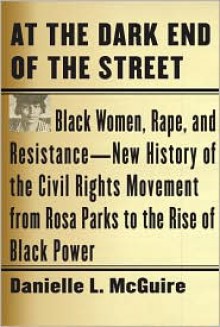
I knew this would be an informative book, but I didn't expect to enjoy it this much. It's the kind of book that should be read and analyzed and discussed in classes and prevention training sessions everywhere.
It's been on my TBR since about the time it was published but I just now got it together to read it. I usually hate talking about rape, particularly when I'm already talking about feminism. For years, I had viewed rape and abortion as the only two things feminists talked about and I hated that. That was when I was still in the primary target age and it terrified me to be reminded that often. As I've embraced the label of feminist in recent years, it's taken me a while to be okay with talking about rape. It took a while to find my voice in it, but this book would have helped me do that sooner.
See, I'm only slightly younger than the author, so I remember those times in the '90s when it almost seemed like people cared. I remember ingesting all the messages from television and schools that almost made it seem like it wouldn't have been my fault, except that everyone knew it really would have been because it's always actually about how not-cautious and unprepared the victim was. No one was saying yet that we should just teach people not to rape. No one was using the word consent, not around me.
Just as Harding contends, the landscape is changing now and it's changing in a beautiful way. The generation that is coming up now is amazing in its embrace of that the victim didn't invite it, couldn't have invited it. Harding writes beautifully about the problems we've seen in recent decades and the amazing things that were happening around the writing of the book and the things that look like they are on our horizon.
She writes with an entertaining style that was both friendly and firm. She does not let us delude ourselves about the world we live in but she does provide hope and paths to new understandings. Rape has been talked about and taught about one way for so long that changing the conversation isn't going to happen immediately, but her book is another in a line of books that are changing the conversation from "why was she there" "what was she wearing" to "why did he do that". But she doesn't miss the opportunity to stand up for men and that they can be victims too, of each other and of women. She doesn't miss the opportunity to talk about the fact that there are lots of men out there who are perfectly great and respectful partners that don't rape. But there are those who do and we aren't calling them out near enough.
There's lots of information in this book that I had before but there is lots that I didn't. Everyone should read the book, talk about it with others, and analyze it along with the world around them. It's important to talk about rape and consent.
Something not mentioned in the book, but that I would like to add to the conversation is that it is never too early to talk about consent because it is a part of everything at every age. We've been using that word in situations with my son since he was about 3 years old (he's six now). It came up when he expressed that he didn't like being squeezed when we hug him. Instead of using the kind of language that is usually reserved for children of this age, we made the conscientious decision to use the word consent. Hugs must be consented to each time and the appropriate level of squeeze is negotiated throughout. There must be enthusiastic consent to hug any one at any time and that is reinforced with visitors to our home. Or tickle. Or wrestle with. Or touch. Or smooch. Or help him in the bathroom. Or call him by any nickname. Or label him in any way.
I feel like part of the problem with talking about what affirmative consent is and looks like is that we reserve it for discussing sex. That may be too sensitive a topic to start with and it's definitely too old for them to just be learning the concept. By then, we have waited until they've gotten used to being able to touch without asking for it and being touched without giving it. We have waited until they have determined that we can't be that serious about it because they've already done so many things they weren't allowed to do. So we started using consent early.
Pick up this book. Read it. Talk about it. Talk about consent. Use it in everyday situations. Don't miss an opportunity to increase your knowledge of rape culture and your ability to be a part of changing the conversation and helping the next generation improve things.

 Log in with Facebook
Log in with Facebook 









